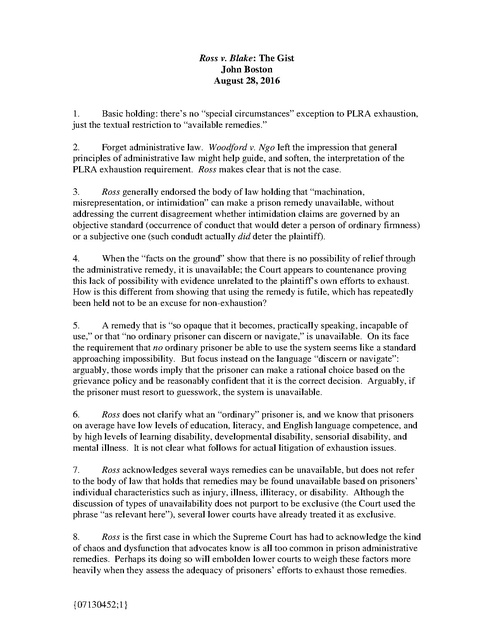Ross v. Blake - The Gist, Boston, 2016
Download original document:

Document text

Document text
This text is machine-read, and may contain errors. Check the original document to verify accuracy.
Ross v. Blake: The Gist
John Boston
August 28, 2016
1.
Basic holding: there’s no “special circumstances” exception to PLRA exhaustion,
just the textual restriction to “available remedies.”
2.
Forget administrative law. Woodford v. Ngo left the impression that general
principles of administrative law might help guide, and soften, the interpretation of the
PLRA exhaustion requirement. Ross makes clear that is not the case.
3.
Ross generally endorsed the body of law holding that “machination,
misrepresentation, or intimidation” can make a prison remedy unavailable, without
addressing the current disagreement whether intimidation claims are governed by an
objective standard (occurrence of conduct that would deter a person of ordinary firmness)
or a subjective one (such condudt actually did deter the plaintiff).
4.
When the “facts on the ground” show that there is no possibility of relief through
the administrative remedy, it is unavailable; the Court appears to countenance proving
this lack of possibility with evidence unrelated to the plaintiff’s own efforts to exhaust.
How is this different from showing that using the remedy is futile, which has repeatedly
been held not to be an excuse for non-exhaustion?
5.
A remedy that is “so opaque that it becomes, practically speaking, incapable of
use,” or that “no ordinary prisoner can discern or navigate,” is unavailable. On its face
the requirement that no ordinary prisoner be able to use the system seems like a standard
approaching impossibility. But focus instead on the language “discern or navigate”:
arguably, those words imply that the prisoner can make a rational choice based on the
grievance policy and be reasonably confident that it is the correct decision. Arguably, if
the prisoner must resort to guesswork, the system is unavailable.
6.
Ross does not clarify what an “ordinary” prisoner is, and we know that prisoners
on average have low levels of education, literacy, and English language competence, and
by high levels of learning disability, developmental disability, sensorial disability, and
mental illness. It is not clear what follows for actual litigation of exhaustion issues.
7.
Ross acknowledges several ways remedies can be unavailable, but does not refer
to the body of law that holds that remedies may be found unavailable based on prisoners’
individual characteristics such as injury, illness, illiteracy, or disability. Although the
discussion of types of unavailability does not purport to be exclusive (the Court used the
phrase “as relevant here”), several lower courts have already treated it as exclusive.
8.
Ross is the first case in which the Supreme Court has had to acknowledge the kind
of chaos and dysfunction that advocates know is all too common in prison administrative
remedies. Perhaps its doing so will embolden lower courts to weigh these factors more
heavily when they assess the adequacy of prisoners’ efforts to exhaust those remedies.
{07130452;1}

